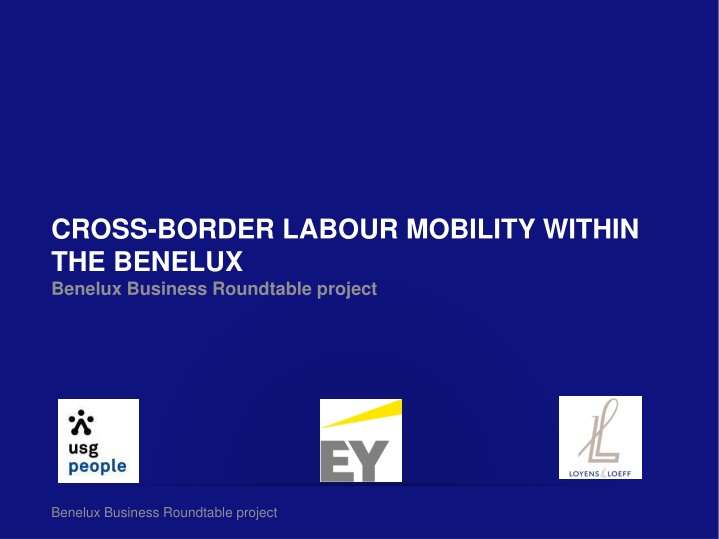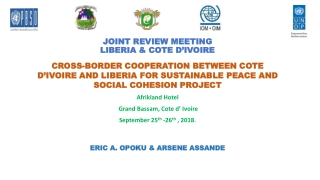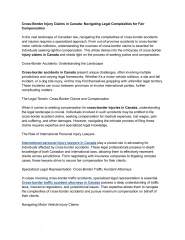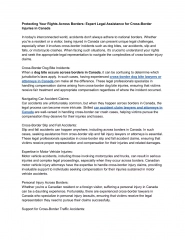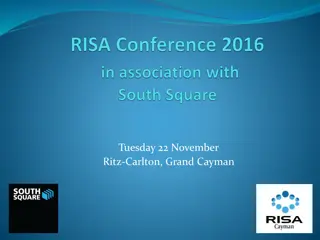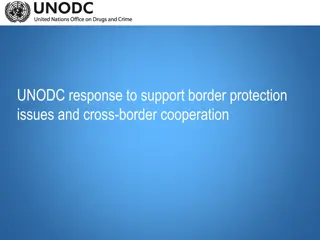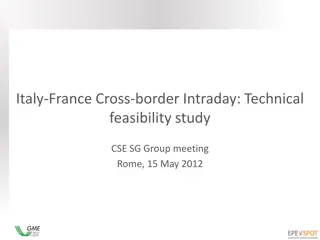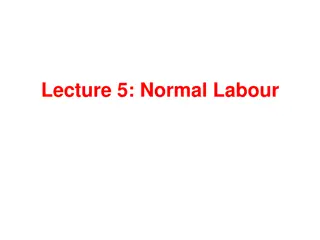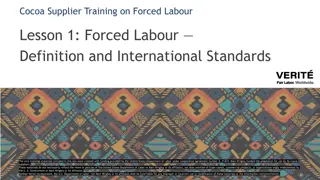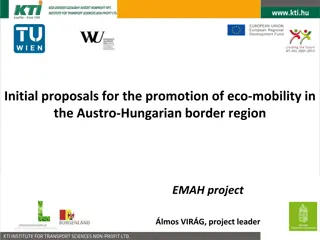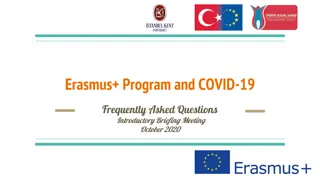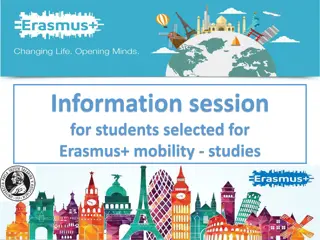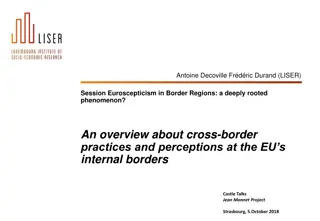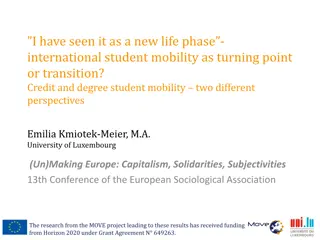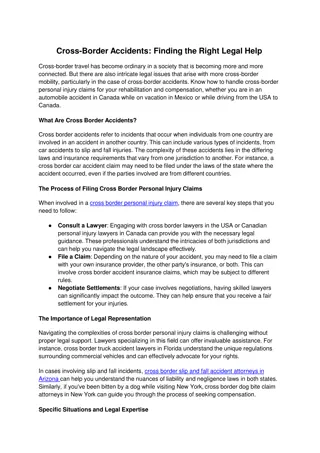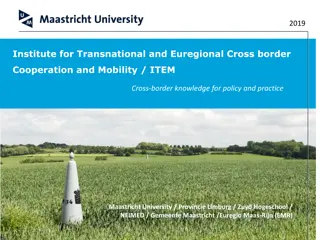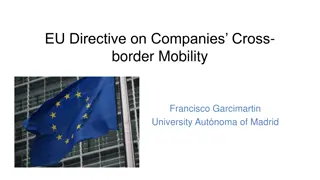Proposals for Enhancing Cross-Border Labour Mobility in the Benelux Region
Recommendations focusing on removing administrative barriers and promoting cross-border labour mobility to combat unemployment, unleash the region's labor force potential, and facilitate collaboration among business leaders for closer cooperation.
Download Presentation

Please find below an Image/Link to download the presentation.
The content on the website is provided AS IS for your information and personal use only. It may not be sold, licensed, or shared on other websites without obtaining consent from the author.If you encounter any issues during the download, it is possible that the publisher has removed the file from their server.
You are allowed to download the files provided on this website for personal or commercial use, subject to the condition that they are used lawfully. All files are the property of their respective owners.
The content on the website is provided AS IS for your information and personal use only. It may not be sold, licensed, or shared on other websites without obtaining consent from the author.
E N D
Presentation Transcript
CROSS-BORDER LABOUR MOBILITY WITHIN THE BENELUX Benelux Business Roundtable project Benelux Business Roundtable project
Index Promotion action on cross border employment Launch promotion campaign to actively promote cross-border employment Set up a single point of contact for personalized information, supported by a specific website Promote language training as of primary school Improve cross-border public transport and invest in infrastructure Increase legislation coordination Increase synchronized implementation of EU legislation Assess cross-border impact of new legislation + investigate rationale of differences Cutting red tape for company Simplify employment income reporting Reduce immigration formalities to allow widening international hiring pool Simplify the process for foreign social security and wage tax payments Align income taxation regime for individuals Streamline tax reporting formalities and allow pro rata personal tax deductions Introduce optional uniform Benelux tax legislation for cross-border income Take a uniform approach to taxation of severance payments 2 Benelux Business Roundtable project
Introduction Benelux Business Round Table Proposals and recommendations on cross-border labour mobility The Committee of Ministers of the Benelux has recently identified cross-border labour mobility as a crucial tool for increasing competitiveness and job growth in this region with its ever- growing economic interconnectedness. The BBR fully shares this view and wishes to contribute to achieving this goal. Labour mobility enhances the matching of employment supply and demand, helps employers have the right competencies in the right place at the right time, is instrumental towards achieving a single market and helps reduce cultural and linguistic barriers. The proposals and recommendations in this paper are based on the actual experiences of many companies that participated in its preparation. These proposals and recommendations focus mainly on removing unnecessary administrative barriers and actively promoting cross- border labour mobility (with a view to becoming a role model). Implementing them will help combat unemployment and unlock the potential of the labour force in this region. Cross- border working, at any level, should be seen as an opportunity and should be encouraged and facilitated where necessary. The BBR brings together a group of business leaders from the Benelux representing companies that make a significant contribution to GDP, employment and assets within the region with the aim of identifying areas and actions where closer collaboration is required and putting forward recommendations to political leaders at national and EU level where political action is deemed necessary. 3 Benelux Business Roundtable project
Approach On 14 January 2015 an initial kick-off meeting was organised involving a multi-disciplinary team consisting of EY, Loyens & Loeff and representatives of USG People from the Netherlands and Belgium. The meeting was used to define the issues and decide how the required information should be gathered. A two-pronged approach was chosen: Surveys amongst members of the BBR and clients of the three organisations; Desk research of client cases involving cross-border issues. It was also decided at the kick-off meeting to engage the expertise of Maastricht University for the project. The university has exclusive knowledge concerning the cross-border recognition of qualifications. In a second session all parties involved drew up a longlist of all the issues based on the interviews and the desk research. These topics were fleshed out by the collective members of the project groups. At the third session all the recommendations were comprehensively discussed and fine-tuned where necessary. The result of these efforts is discussed in the following paragraphs. 4 Benelux Business Roundtable project
Promotion action on cross border employment 5 Benelux Business Roundtable project
Recommendation: Launch a campaign to promote cross-border employment The various interviews and reports show that employers are enthusiastic about cross-border workers, they lend a different kind of cachet to the organisation. At the same time the cross- border workers themselves derive many positive experiences from cross-border working, despite the red tape involved. Major media campaigns targeted at people living and companies operating in the border region are needed to increase the popularity of cross-border working. In addition to campaigns we also recommend developing a dedicated promotional website featuring testimonials, tips, vacancies, etc. in Dutch, French and German. 6 Benelux Business Roundtable project
Recommendation: Provide a Single Point of Information To increase the success of cross-border labour mobility in the Benelux we recommend that the existing information in the three countries is pooled. We recommend setting up a single website for the three countries covering all aspects of cross-border labour mobility in the respective national languages (Dutch, French and German). This information can be provided at various levels: briefly and clearly at the initial level, with face-to-face contact subsequently available to those requiring more detailed and extensive information. We recommend a website that is aimed at both workers and employers from the three countries, with separate platforms for accessing information on the topics of living, working and entrepreneurship. The website should also comprise an interactive component (a forum) where workers and employers can share their knowledge and experiences. We believe that the website http://startpuntgrensarbeid.benelux.int could be expanded to encompass these recommendations. 7 Benelux Business Roundtable project
Recommendation: Publicise and promote the website and cross- border labour mobility The website will only be successful if it reaches a wide audience. We therefore also recommend that the relevant ministries of the three countries create publicity for this website and for cross-border labour mobility in general. Ministries have an important role to play in providing schools, organisations and businesses with information on cross-border labour mobility. Testimonials from workers and employers on the website or distributed through other channels can encourage people to work across the border, while companies active in interim management also have an important role to play in stimulating cross-border labour mobility. These are flexible ways of acquainting workers and employers with cross-border labour mobility. 8 Benelux Business Roundtable project
Recommendation: Provide possibility of personalising the information In addition to the information on the website workers and employers should be able to obtain more detailed and personalised information through a contact centre. The aim should be to have a single point of contact within the centre. We recommend close cooperation with team GWO Heerlen , possibly supported by a specialist from Luxembourg. Moreover we would recommend taking an integrated approach that also encompasses social security and tax aspects. 9 Benelux Business Roundtable project
Recommendation: Promote teaching the languages of neighbouring countries in primary schools From a linguistic and cultural perspective one of the most important barriers to cross-border employment is the inability to speak each other s language. The ability to express oneself clearly and understandably is one of the key elements to a successful career. It may be the case that the languages of neighbouring countries are already taught in primary schools, but only informally. Another possibility is to introduce an exchange programme to enable schoolchildren to interact linguistically and culturally. This would enhance mutual understanding, remove obvious obstacles to developing a future career abroad and expand the pool from which employers in the Benelux can select their staff. 10 Benelux Business Roundtable project
Recommendation: Improve cross-border public transport and invest in infrastructure While each Benelux country has its own extensive network of motorways, railways and other forms of public transport as well as links to trans-European networks, cross-border public transport is rather limited. Travelling by train to Antwerp from Maastricht, to Eindhoven from Brussels or to Rotterdam from Luxembourg is time-consuming, even though all these cities are just a stone s throw apart. This would cut commuting times and facilitate cross-border employment. For example, the travel time from Brussels to Luxembourg on a high-speed connection without stops could be as low as 45 minutes. We would recommend investing in an integrated international approach to the Benelux s transport infrastructure, making sure that Benelux projects linking the three countries and the region to the rest of Europe are a priority. 11 Benelux Business Roundtable project
Increase legislation coordination 12 Benelux Business Roundtable project
Recommendation: Effect synchronised implementation of European employment and social security legislation National employment and social security rules are logically specific to the country in question. In cross-border situations these can have a significant impact, for example on holiday pay, paid public holidays and language requirements. For example, a Luxembourg or Dutch company that seconds employees to Belgium must comply with all employment legislation or face criminal sanctions. Salary (at least the Belgian part) must be indexed, salary must be paid in 13.92 installments and statutory holiday must be respected, even if the employee enjoys similar terms in their home country. This can lead to unnecessarily complex administrative situations. Also European social security law and employment law may conflict in an international situation, for example when it comes to sickness payment. Full harmonisation of legislation is unlikely to happen and is therefore not what we are requesting. We recommend that the respective countries revisit (the implementation of) European legislation in order to better facilitate cross-border employment, thereby respecting the required European minimum conditions. 13 Benelux Business Roundtable project
Recommendation: Introduce a cross-border impact assessment for new legislation Various employers perceive new legislation as focusing mainly on national interests and only to a limited extent on the impact at a cross-border level. We would recommend introducing a cross-border impact assessment during the legislative process to avoid unforeseen side effects of new legislation on cross-border employment. We would propose that such pre- assessment be introduced only for bills that have a bearing on cross-border employment. 14 Benelux Business Roundtable project
Cutting red tape for company 15 Benelux Business Roundtable project
Recommendation: Facilitate payment of employment tax Payment of employment taxes to foreign authorities is one of the most frequently mentioned difficulties reported by companies engaging in cross-border employment. This situation may occur for example if an employee is subject to the social security system in their own country or if the employer is obliged to file wage tax returns in the foreign country where the employee works and/or resides. The employer has to register abroad, operate under a wage tax and social security system they are unfamiliar with, and may have to communicate with foreign tax authorities in a foreign language. Companies would find it helpful if their affiliated entity in the other (work) country were legally permitted to assist with these formalities. To alleviate the process of paying foreign employment taxes the Benelux could introduce the possibility of voluntarily requesting the affiliated entity to take over responsibility for paying wage tax and/or social security premiums abroad. This rule already exists in the Netherlands, while Belgium has a similar approach with regard to social security (gentlemen's agreement) applicable to companies belonging to the same financial group. This possibility is however limited to assignments between group companies and is not applicable in the case of multiple employment contracts within a group of companies. We would recommend broadening the scope of these rules to also include these contracts, which could then be used as best-practice rules within the Benelux. 16 Benelux Business Roundtable project
Recommendation: Introduce 60 days rule for economic employer principle as best practice Companies who for example second an employee to an affiliated entity abroad are faced with the question of whether this foreign entity qualifies as the employee s economic employer for tax purposes. Within the Benelux, the concept of the employer is interpreted from an intrinsic (economic) perspective instead of purely in terms of the contractual (formal) employment structure. The economic employer integrates the employee in its business operations, is permitted to train the employee, benefits from and bears the risk of the work performed and bears the cost of remunerating the employee from a tax perspective. During their international secondment the employee is generally placed at the disposal of the recipient entity, meaning that the foreign entity can be regarded as the economic employer. As a result the employee s income from employment will be subject to taxation in the country of work and in many cases the home or the host entity will be required to register for wage tax purposes and to pay wage taxes. In the case of short-term secondments the administrative costs involved may be disproportionately high and the tax revenue rather limited (taxation is often charged at the lowest rates). To cut the red tape we would recommend introducing a 60 days rule for the Benelux under which no economic employer would be necessary in a country if the employee works less than 60 days per calendar year in that country, without any restrictions. A similar rule already applicable in the Netherlands and the UK could serve as inspiration. 17 Benelux Business Roundtable project
Recommendation: Take a uniform approach to taxation of severance payments Companies employing staff internationally are faced with somewhat complex taxation rules when an employment contract is terminated. A severance payment may be allocated for taxation in the employee s various countries of work, meaning that the employer may have to pay wage tax abroad or adjust their salary administration. The new Commentary on the OECD Model Tax Convention states that allocation of taxing rights should follow the taxation of regular employment income in the last 12 calendar months. In the case of a cross-border commuter, with an international working pattern or an international secondment, both the home and the host state could be entitled to (partially) tax the severance payment. We would recommend that the Benelux tax authorities take a uniform approach to how severance payments are taxed in an international situation. It would be helpful if the authorities would clarify whether and as of when they will adhere to the aforementioned Commentary and whether the cross charging of severance payments to a foreign entity is relevant. 18 Benelux Business Roundtable project
Recommendation: Introduce optional uniform Benelux tax legislation for cross-border employment situations (1/2) Which country has the right to tax the employment income of a cross-border commuter is determined by the tax treaties concluded between the Benelux countries. Employment income relating to days worked in the country where the employer is based is allocated for taxing in that country. Income relating to days worked in the home country (e.g. from a home office) or to business trips to third countries is allocated for taxing in the home country. This may result in taxing rights being split among multiple countries, which is also referred to as a salary split . At one time this situation was fairly unusual but nowadays, with digital devices such as tablets and smartphones having increased employees international mobility, parties need to be aware that an employer s policy to for example encourage working from home might have unwanted side effects if it entails a shift to taxation in the home country. Due to the complexity of the rules companies and employees often do not realise that they are faced with a salary split situation, which requires the filing of wage or income tax returns to take this international working pattern into account. They are often under the false impression that an employee s salary is taxable in the country where it is paid. Companies have pointed out that correct application of the current rules results in an administrative complexity which is a barrier to cross-border employment, from both the employer s and the employee s perspective. 19 Benelux Business Roundtable project
Recommendation: Introduce optional uniform Benelux tax legislation for cross-border employment situations (2/2) In light of this we would recommend the implementation of a Benelux tax treaty that would introduce uniform tax legislation to apply in an international employment situation. This could take the form of an opt-out or on request system with the existing tax rules also continuing to apply. Inspiration may be drawn from the European Regulation on the coordination of social security schemes, which embraces the basic principle that an employee is only subject to one social security scheme at any time. Not only would this approach simplify procedures, it would also make it easier for employees to benefit from personal tax deductions if the employment income were fully allocated for taxation in a single state. 20 Benelux Business Roundtable project
Recommendation: Designate a single central service for payment of foreign social security/wage tax An employer employing a cross-border commuter may be liable to pay social security contributions in the employee s country of residence. This situation occurs if an employee structurally spends a substantial part (25% or more) of their time working in their home country and is therefore subject to their home social security scheme. Complex situations may similarly arise for civil servants who also perform activities as a self-employed person or employee. Companies experience the administrative formalities involved in paying foreign social security contributions and/or wage tax for their employees as a real burden. Registration with the foreign authorities is required, the contributions have to be calculated based on the home social security legislation, a shadow payroll may have to be processed to report the amounts to the foreign authorities, communication with the foreign authorities will be required, and the foreign contributions have to be correctly entered/processed in the employer s salary administration. Given the increased scope for working from home, it is expected that a growing number of cross-border workers will become subject to their home social security system and will have to pay home country tax. To alleviate the burden for their employers we would recommend designating a single central (tax and/or social security) service desk for the Benelux or for the individual countries. This central service desk or desks could function as a gateway for employers, collecting the contributions and/or wage tax due and conducting any further liaisons with the competent authorities in the employee s home country. This would save the employer from having to deal with foreign authorities and complicated registration procedures. 21 Benelux Business Roundtable project
Recommendation: Explore possibilities for companies to widen their international hiring pool (1/2) The companies we interviewed reported that they feel the need to hire international employees despite the administrative complexities simply because they cannot always find qualified staff in their home employment market. If the preferred candidate has non-EU citizenship, companies find it almost impossible to hire this individual, even if the individual is legally residing within the Benelux. For example, it is not possible to transfer a Chinese citizen, who is legally residing and working for company A in the Netherlands, onto a local contract with affiliated entity B in Belgium, unless they have long-term residence status. This is often because the residence permit and work permit are linked and cannot be granted separately. As a cross-border commuter will retain residence in their home country, separate documents will be required. At present emigration to the work country often cannot be avoided, constituting an obvious barrier to cross-border employment. Moreover work permits are often issued for a limited period, preventing employers from concluding employment contracts for an indefinite period. 22 Benelux Business Roundtable project
Recommendation: Explore possibilities for companies to widen their international hiring pool (2/2) The procedure for renewing the work permit may require the employer to reopen the vacancy and give preference to EU candidates, even though they are satisfied with the work of the non-EU employee. Furthermore, we were informed that start-ups, for example on the Chemelot Campus in the Netherlands, often have trouble finding the right staff. They cannot afford to offer the Dutch minimum salary of approx. 5,000 gross per month, meaning they are unable to apply the less stringent Dutch immigration provisions and have to apply for a regular working permit, which in most cases is rejected. In addition we were informed that knowledge institutes also experience difficulties when hiring international support staff, think for instance of hiring a US marketing officer to recruit US students. Unfortunately the European blue card (equivalent to the US green card) did not live up to its initial promise of providing a solution in such cases. As the Benelux is focussing on fostering a knowledge- driven economy, we would recommend introducing a pilot designating certain (knowledge) sectors or regions where more flexible conditions and fewer time restrictions apply to hiring non-EU staff to legally work and reside within the Benelux. 23 Benelux Business Roundtable project
Align income taxation regime for individuals 24 Benelux Business Roundtable project
Recommendation: Allow personal tax deductions pro rata to a country s taxing rights At present the Dutch and Belgian tax authorities only allow personal tax deductions by cross-border workers in their country of employment if their employment income is subject to taxation in that country at a level of 75% (Belgium) or 90% (the Netherlands). It is difficult for employers to request their cross-border commuter employees to work internationally (from home or on business trips) if this results in them losing out on their personal income tax deductions. To encourage cross-border working we would recommend allowing personal tax deductions in the Benelux pro rata to a country s taxing rights on the employment income. For instance if 70% of the employment income is taxable in country A, then country A will grant 70% of the applicable tax deduction. 25 Benelux Business Roundtable project
Recommendation: Streamline the income tax return of cross-border workers Cross-border workers within the Benelux must report their worldwide income on their income tax return in their home country. They have to translate the annual salary statement they receive from their employer to determine their taxable salary according to the tax legislation of their home country. This is often perceived to be complex. We would recommend enclosing a leaflet with the income tax return explaining the most common salary elements (such as pension, company car, social security). Inspiration for best practices may be drawn from the explanation leaflet of the Dutch tax authorities for Dutch residents with Belgian income. Furthermore, we recommend enabling cross-border workers to file their income tax return in the Netherlands electronically using a Dutch DigiD (not possible at present). Finally we would recommend aligning the timing of payments and refunds of income tax assessments within the Benelux if so requested by the individual. This would avoid the cash flow problems which may arise where payment and refund dates are different. 26 Benelux Business Roundtable project
Appendix 27 Benelux Business Roundtable project
Organisations which participated in the survey Call-IT (NL + BE) DEME Group Cargill Comtree Client Communication Center Alphabet Nederland B.V. VDL Nedcar B.V. Maastricht University Koninklijke Philips B.V. Mercedes-Benz Financial Services ASML DAF Trucks N.V. Numac Groep Verduijn s Fine Biscuits Con-Pac Janssen Pharmaceutica N.V. Bayer CropScience Vegetable Seeds Max Aluminium Profielen Datwyler Pharma Packaging Int. 7 anonymous 28 Benelux Business Roundtable project
Recommendation: Investigate the rationale behind the differences in national legislation - appendix There is no harmonisation of direct taxes at EU level as this is an area within the competence of the individual Member States. This means that Member States are responsible for their own tax legislation. It should be noted that the European Court of Justice has ruled that factors to be taken into account in the tax system must include the free movement of employees. This does not alter the fact that disparities continue to exist between the laws of the various Member States. These pertain for example to allowable income tax rates and the difference in the deductions allowed by the various countries (Gilly case). Other differences may concern additional tax liability on company cars, the treatment of health insurance or child maintenance costs. In order to create proposals for a more uniform treatment the problems need to be compiled and best practices within the Benelux must be identified and analysed. This issue can be linked to the Introduce a cross-border impact assessment for new legislation recommendation. 29 Benelux Business Roundtable project
